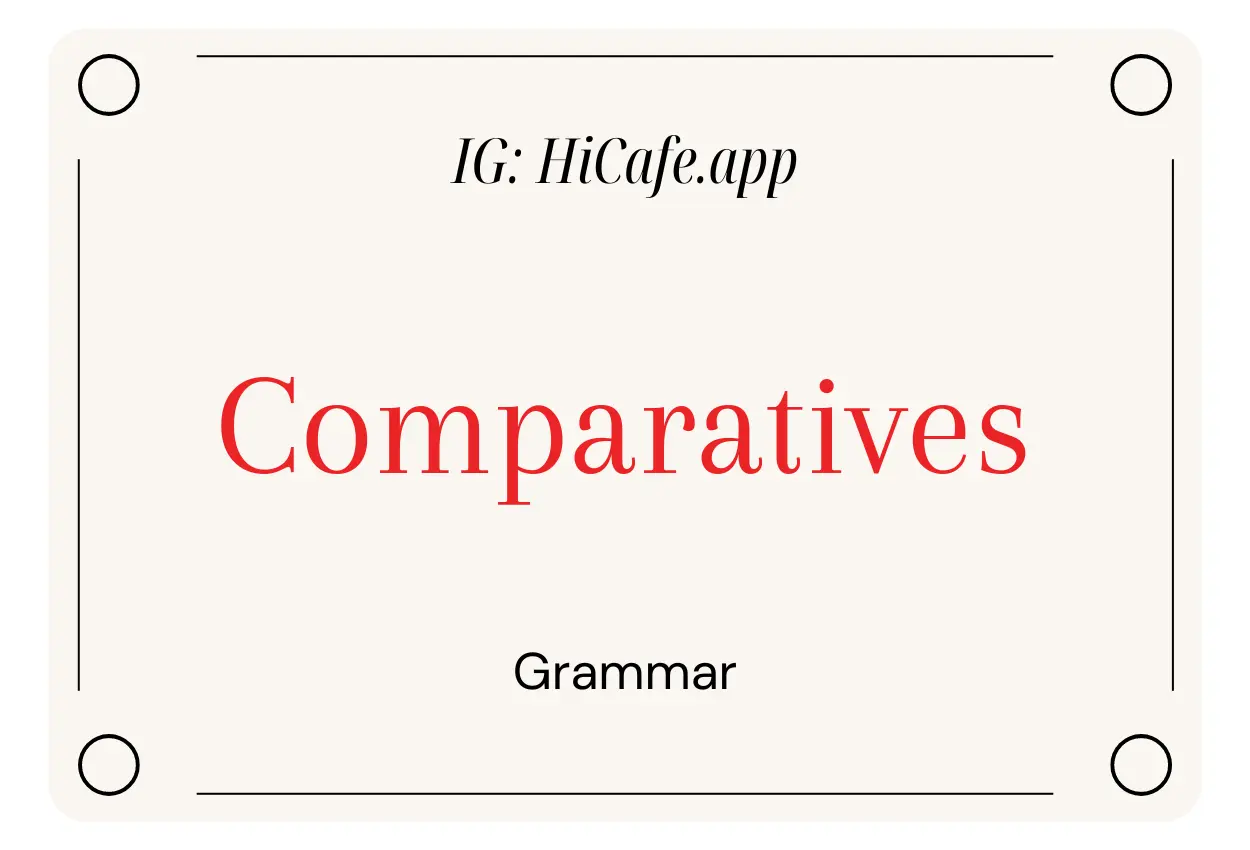
Grammar Level 3- Lesson Six- Comparatives in English Grammar
In this grammar lesson, you learn about Comparatives in English grammar and how to use it in your English conversation and writing. Just follow examples and write them down a few times to learn them very well. After finishing this lesson, you should work on its quiz.
Grammar Recap
In our previous lesson, we covered the Present Perfect Questions Grammar If you just landed on this page, we suggest that you complete our previous lesson including its quizzes before continuing on this lesson.
Requirement Lessons
There is no required lessons for working and learning this lesson.
Comparatives Examples
Use “er” at the end of small words. (one syllable)
Use “more” in front of long words (2+ syllables)
- A lion is bigger than a cat.
- A lion is more dangerous than a cat.
- The children playing with the blocks are
- younger than the students going to school.
Here are some more examples:
- Saving money this year has been more difficult than last year.
- Japanese cars are much better than most American cars.
- Spanish is an easier language to learn than English.
Note: It’s not always necessary to use “than”
- Compared to last year, saving money this year has been more difficult.
- Compared to American cars, Japanese cars are much better.
- Compared to English, Spanish is an easier language.
The comparative form is used to show the difference between two things or two people, two groups of things, or two groups of people.
There are rules for using the comparative form. The table below will help you.
|
The Comparative Form for Adjectives
|
||
|
One-syllable words
|
two-syllable words ending in y
|
two syllables or more not ending in y
|
|
add er
|
drop the y and add ier
|
use more / don’t add er
|
|
big
 bigger bigger |
noisy
 noisier noisier |
dangerous
 more dangerous more dangerous |
|
old
 older older |
busy
 busier busier |
expensive
 more expensive more expensive |
|
nice
 nicer nicer |
crazy
 crazier crazier |
comfortable
 more comfortable more comfortable |
|
young
 younger younger |
lazy
 lazier lazier |
humid
 more humid more humid |
|
fast
 faster faster |
funny
 funnier funnier |
tired
 more tired more tired |
|
cheap
 cheaper cheaper |
dry
 drier drier |
acceptable
 more acceptable more acceptable |
| There are some exceptions: good, bad, far, and fun are adjectives that don’t follow the rules when making the comparative form. | ||
|
good
 better better |
bad
 worse worse |
far
 farther farther |
|
fun
 more fun more fun |
||
Never use two comparatives together on an adjective:
more cheaper
more noisier
more older
Comparatives and Superlative Exercises
Now that you learned your new lesson, it is time to go to the Comparatives page and finish your quiz. While working on your quiz, you can always go back to its lesson to refresh your memory.
Private Lessons in English
If you need help with quizzes of this lesson, you can hire one of our expert private English teachers by going to our Private English Tutoring page and submit a request. When submitting your request, make sure to mention the grammar level and lesson number.
Next Grammar Lesson
In our next lesson, we will cover the Superlatives in English Grammar Before moving to the next lesson, we suggest that you complete this lesson including its quizzes.
Related Grammar Lessons
None
Grammar Level 3 Outline
If you wish to explore all lessons that are covered in HiCafe Grammar Level 3, you can visit the Grammar Level 3 Outline page.
Practice English Grammar Skills
For a comprehensive practice of English grammar with quizzes, you can visit the Improve English Grammar Skills page to view HiCafe 250 grammar lessons in 7 levels plus prepositions and pronouns.


